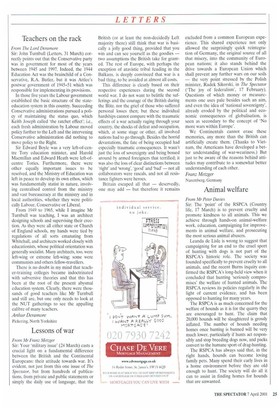Lessons of war
From Mr Franz Metzger Sir: Your 'military issue' (24 March) casts a crucial light on a fundamental difference between the British and the Continental Europeans: their attitude towards war. It's evident, not just from this one issue of The Spectator, but from hundreds of publications, from private and public statements or simply the daily use of language, that the British (or at least the non-decidedly Left majority there) still think that war is basically a jolly good thing, provided that you win and can see yourself as the goodies — two assumptions the British take for granted. The rest of Europe, with perhaps the exception of atavistic tribal feuding in the Balkans, is deeply convinced that war is a bad thing, to be avoided at almost all costs.
This difference is clearly based on their respective experiences during the second world war. I do not want to belittle the sufferings and the courage of the British during the Blitz, nor the grief of those who suffered personal losses then; but these individual hardships cannot compare with the traumatic effects of a war actually raging through your country, the shocks of defeat and occupation, which, at some stage or other, all involved nations had to go through. Besides the horrid devastations, the fate of being occupied had especially traumatic consequences. It wasn't just the loss of sovereignty and being bossed around by armed foreigners that terrified; it was also the loss of clear distinctions between 'right' and 'wrong', 'good' and 'bad' — not all collaborators were rascals, and not all resistance fighters were heroes.
Britain escaped all that — deservedly, one may add — but therefore it remains excluded from a common European experience. This shared experience not only allowed the surprisingly quick reintegration of Germany, the original source of all that misery, into the community of European nations; it also stands behind the drive towards a European Union which shall prevent any further wars on our soils — the very point stressed by the Polish minister, Radek Sikorski, in The Spectator (The joy of federalism', 17 February). Questions of which money or measurements one uses pale besides such an aim, and even the idea of 'national sovereignty', already eroded by the political and economic consequences of globalisation, is seen as secondary to the concept of 'No more wars within Europe'.
We Continentals cannot erase these memories, any more than the British can artificially create them. (Thanks to Vietnam, the Americans have developed a better understanding of war-weariness.) But just to be aware of the reasons behind attitudes may contribute to a somewhat better understanding of each other.
Franz Metzger
Nuremberg, Germany


























































 Previous page
Previous page